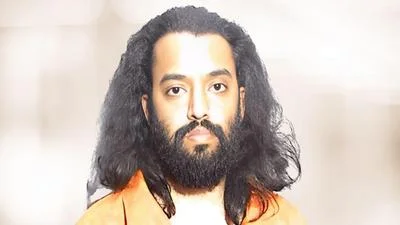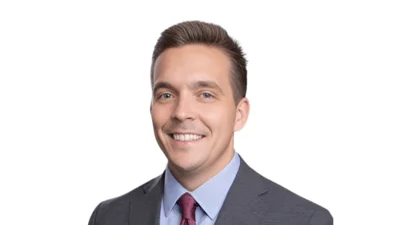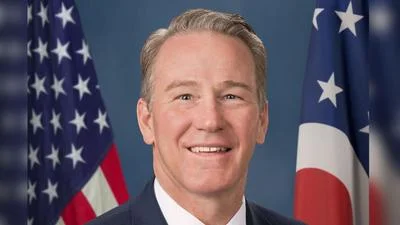The following is the prepared text of the baccalaureate address delivered by Assistant Professor of English Travis Chi Wing Lau at the Senior Recognition Ceremony held on Dec. 16, 2022. L | Kenyon College (https://s3.amazonaws.com/jnswire/jns-media/04/f7/12043307/1.jpg)
The following is the prepared text of the baccalaureate address delivered by Assistant Professor of English Travis Chi Wing Lau at the Senior Recognition Ceremony held on Dec. 16, 2022. L | Kenyon College (https://s3.amazonaws.com/jnswire/jns-media/04/f7/12043307/1.jpg)
The following is the prepared text of the baccalaureate address delivered by Assistant Professor of English Travis Chi Wing Lau at the Senior Recognition Ceremony held on Dec. 16, 2022. Lau was selected by this group of seniors to speak at the event marking the conclusion of their Kenyon coursework. Watch a recording of the ceremony.
Before I begin, I want to express my deepest gratitude to the senior class for inviting me to deliver this year’s baccalaureate address. Having joined the Kenyon faculty very recently in the thick of the pandemic in 2020, these past few years have been an extended process of finding my bearings at my new academic home. To know I have made an impact on some of you in this room as a junior faculty member means a great deal to me. As I have come to realize, the pandemic has renewed my attachment to ritual — events and practices like this ceremony, which remind us of what it means to be in community with one another and which enable us to celebrate our achievements in the face of ongoing social, political, cultural, economic and environmental crises that have shaped the academic careers of each of the seniors sitting in this room today. Over the multiple drafts of this talk I have written to arrive at this final incarnation, I have come to understand my ethical responsibility this evening is precisely not to turn away from the challenging conditions that have formed this new generation of young thinkers; not to deliver empty platitudes sugarcoated and saccharine that will not serve you in the years to come. My goal this evening is thus to do something that will seem at first deeply counterintuitive. I hope to defend the value of two affective experiences that you have felt and will feel again after leaving Kenyon: doubt and uncertainty.
In a 1903 letter to then 19-year-old officer cadet and young poet Franz Xaver Kappus, the Austrian poet and novelist Rainer Maria Rilke wrote the following (quoted here in translation):
“I want to beg you, as much as I can, dear sir, to be patient toward all that is unsolved in your heart and to try to love the questions themselves like locked rooms and like books that are written in a very foreign tongue. Do not now seek the answers, which cannot be given you because you would not be able to live them. And the point is, to live everything. Live the questions now. Perhaps you will then gradually, without noticing it, live along some distant day into the answer.”
Kappus wrote to Rilke for two reasons: to have him appraise his work and to figure out whether a poet’s life was worth pursuing. However, rather than judging the merit of Kappus’ work, Rilke gently pushed back on Kappus’ desire for an easy justification for either the choice of a literary career or a military career. He invited him instead to inhabit, however uncomfortable it may be, this moment of deep uncertainty about what is to come next for him personally, creatively, and professionally. In many ways, this passage is characteristic of Rilke’s advice: that the cultivation of one’s inner life is a deliberate process that takes time and struggle, that exceeds our awareness and cannot be forced into being. I won’t reveal what Kappus ultimately decided, but Rilke’s words feel particularly prescient, if not haunting, given that both Rilke and Kappus would live through the First World War beginning about a decade later.
But as much as the passage I just read is frequently quoted out of context from one of the 10 letters compiled by Kappus into the collected “Briefe an einen jungen Dichter,” or “Letters to a Young Poet,” which he published in 1929 but three years after Rilke died of leukemia, Rilke revisits these ideas again in another letter written about a year later:
“Your doubt may become a good quality if you train it. It must become knowing, it must become critical. Ask it, whenever it wants to spoil something for you, why something is ugly, demand proofs from it, test it, and you will find it perplexed and embarrassed perhaps, or perhaps rebellious. But don’t give in, insist on arguments and act this way, watchful and consistent, every single time, and the day will arrive when from a destroyer it will become one of your best workers — perhaps the cleverest of all that are building at your life.”
I distinctly remember reading this as an English major at UCLA when I was feeling particularly adrift with my own graduation looming over the horizon. For some context, I graduated high school during the 2008 financial crisis, which set the tone for many of us about to go to college in the thick of a recession that would cost many people their jobs, their homes and their futures. I graduated from an extremely competitive charter high school that gleefully perpetuated a deeply unsustainable culture of hyperproductivity and destructive expectations of exemplary achievement framed as “rigor.” I internalized a lot of these expectations, especially being around peers from similar immigrant backgrounds who were raised to fetishize Ivy League educations as the only path toward a successful future, who bragged about how many AP classes they had taken or how high their SAT scores were, who chased rank and the title of valedictorian. These outcomes and the pursuit of them were simply unquestioned because faculty, staff, and students invested them with almost sacred value much to the expense of the students. It all felt like what we were supposed to do. Don’t you care about your future? a guidance counselor said to me when I was struggling to keep up.
Yet, among these fictions that were peddled as truths, the most perverse was the unquestioned belief in a linear path for life. So many high school classmates and I coped with the deep uncertainties of the 2008 financial crisis by doubling down on the certainty of a predictable path and the myth of meritocracy: work hard in school, go to the best college you can, and you’ll come out with a profitable job. A grossly oversimplified and “clean” trajectory toward what I came to learn were entirely arbitrary markers of success based on values that were in fact not my own.
For those of you I have advised in this room, you know that one of my greatest frustrations is the ridiculous assumption that 18-22-year-olds are supposed to know what it is they want to do with their lives (often prior to college!). This feels dangerously teleological — and by teleological, I mean the expectation of a fixed end goal from which one does not deviate. Even at a liberal arts college like Kenyon, I have witnessed the contradictory impulses of students being simultaneously encouraged to explore intellectual interests and different fields of study while also to pre-professionalize early and package themselves as desirable to graduate programs and job opportunities.
So much of early adulthood feels like an exercise in speculative fiction: repeatedly framing ourselves as if we always already knew what we were supposed to be doing with our lives before we even have a chance to figure that out. How are we simultaneously expected to take risks when we’re constantly reminded of the dangers of those risks, especially to our futures that feel increasingly bleak?
Let me be clear that this is not a slight on any of you who have felt these pressures (I sure did and still do) — these impulses are direct consequences of the very real conditions of crisis that I began this talk with; job scarcity, competition and the increasingly unaffordable standards of living are real. But that does not preclude us from asking what the consequences are of being beholden to these conditions and what teleological ways of thinking actually do to us when we cling to them too tightly. I share this with you because I have lived it and still am.
In 2011, I made the decision to pursue a doctorate in literature upon graduation (much to the dismay of my parents and to the disbelief of some of my friends). I gave myself no other option not just because of my student loan debt, but also because I had never once lived a moment of my life without having a clear sense of the next step in my path. I finished at UCLA in May of 2012 and was at the University of Pennsylvania for six more years of education literally that September. Many of my students thinking about graduate school have asked me whether I regret going straight from undergrad to grad school. My answer is typically a deeply unsatisfying no and yes: while I firmly believe graduate school offered me six formative years to really read, think, and develop myself, I regret not permitting myself the option to breathe and explore other possibilities for my life. I worried that taking a break would not make me want to go back to school, would make me lose momentum entirely. But at the heart of that worry was a deep fear: a deep fear of facing the unbearable potential of a life path not already charted out and pre-planned. Graduate school, in that sense, felt “easier” because it gave me a new set of expectations to work within, new horizons to ambitiously commit myself to pursuing — a purpose. It spared me from having to doubt. It spared me from having to ask difficult questions of myself for which I did not yet have answers.
In a move perhaps all too predictable coming from a professor of English, I’m struck by doubt’s etymological associations historically with negative terms like apprehension, dread, fear, risk and danger. We are culturally averse to doubt because it threatens us. But let us return to Rilke’s letters: Rilke challenges us to prioritize the question over the answer. To doubt and doubt mindfully, he suggests, is a lifelong practice of choosing to live one’s life without the comfort of predetermined outcomes that so often guide our decision-making and frame what we think we should be doing. The greater danger Rilke sees is how so often the “should” slips into “should have” — a kind of conditional that becomes an imperative that shuts down possibilities for other ways of living and being. Whose values, beliefs, and behaviors are we committing to when we feel we “should” do something? Are they our own? Have we even dared to ask what our own values are even if the answer might be “I don’t know?” Have we even had the opportunity to admit our own ignorance of our own values in order to determine them for ourselves?
Rilke also tells us that doubt requires training — it is an active practice that requires investment, repetition, failure, and self-reflection even if it will feel in retrospect like you have slowly lived your way into answers without even realizing it. At Kenyon, you’ve been trained to doubt critically: to doubt sources, to doubt arguments, to doubt narratives, to doubt norms. What I implore you to do as you leave the Hill is to continue that training of doubt even if it means relinquishing control and certainty of what often “feels” easy. I will not lie to you: to doubt meaningfully will be inevitably uncomfortable. It will be unsettling, demoralizing when you have long felt like you were supposed to have all the answers. What if you took away that pressure of knowing — or rather — of having been presumed to know all along? Doubt is not incompatible with confidence either; you can very much have confidence in yourself to doubt with purpose, to love the potentialities doubt opens for you even if you cannot anticipate them or control how they reveal themselves to you. That particular form of confidence is the hardest to develop because it requires faith in the uncertain outcomes of the questions you may ask. Faith in the questions themselves that have power in just your asking them. Doubt confidently. Doubt because you owe it to yourself to do so.
But sometimes, the outcome is discovering you must ask different questions entirely or that you’ve been led to asking the wrong questions for you. As a queer person of color, that last part has been particularly challenging to confront in my own life. So much of being queer involves a negotiation with models of living and being that have been prescribed to us. The work of doubt then feels particularly destructive: a deconstruction of these models and a reckoning with those who have prescribed them however lovingly or not. In many ways, being queer means living a life of doubt, painful doubt because we have deviated. After all, queer people have been called deviant for centuries. But I have come to embrace what deviance also means: to turn from an expected path, from the linear and teleological that Rilke reminds us can really hold us back. Whether or not you identify as queer, I invite you to deviate. To meander. To stray. Because it is precisely when you let go of certainty, of the predetermined answer and destination, that you will begin to build a life that leads you to unexpected answers.
Thank you so much for the gift of addressing you this evening. My deepest congratulations to the graduating class and to the communities of love and support that have gathered here this evening to celebrate. Here’s to all that you will live yourself into and all that you will become.
Original source can be found here






 Alerts Sign-up
Alerts Sign-up